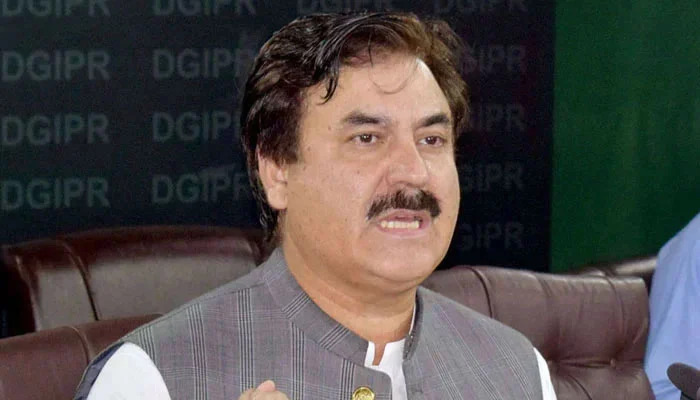Shaukat Yousafzai, a senior leader of Pakistan Tehreek-e-Insaf (PTI), has once again revealed his tendency to politicize judicial decisions when they don’t align with the interests of his party. In his recent remarks regarding the 190 million pounds corruption case involving Imran Khan and Bushra Bibi, Yousafzai claimed that the verdict was nothing more than “political revenge” and that it undermines the rule of law.
This response, rather than showing respect for the judicial process, seems to reflect a deep-rooted belief that legal outcomes can be disregarded when they don’t serve the political narrative of PTI.
Yousafzai’s dismissive approach to the verdict raises serious concerns about his understanding of judicial independence. His statements suggesting that the court’s decision was aimed at destabilizing the country and punishing PTI’s leadership are not only baseless but also harmful to the integrity of Pakistan’s legal system.
By continually attributing such significant legal decisions to political motives, he is effectively rejecting the notion that courts should be free from political influence. This stance sets a dangerous precedent where political figures, rather than accepting responsibility for their actions, can simply dismiss unfavorable legal outcomes as “revenge.”
The evidence presented in court regarding Imran Khan’s involvement in the corruption case was extensive and indisputable. The court’s decision, based on solid legal ground, should be seen as a victory for justice, not a politically motivated attack.
However, instead of acknowledging the facts, Yousafzai’s remarks reflect a troubling tendency within PTI to challenge the judiciary when the ruling is not in their favor. This pattern of behavior not only weakens public trust in the legal system but also undermines the fundamental principles of justice that are supposed to guide any democratic society.
Furthermore, Yousafzai’s suggestion that this verdict harms political stability ignores the role of accountability in maintaining a stable society. A functioning democracy requires that all individuals, no matter their political standing, be held accountable for their actions.
The fact that PTI leaders, like Imran Khan, are facing consequences for their actions should be viewed as a sign of strength in Pakistan’s judicial system, not an attack on political stability. In a democracy, accountability is not optional—it is essential for the country’s growth and integrity.
By labeling the court’s decision as political revenge, Yousafzai not only dismisses the legal process but also sends a dangerous message to the public that the rule of law is secondary to political convenience.
Such remarks, instead of fostering a fair and balanced political environment, contribute to an atmosphere where laws can be disregarded whenever it suits a particular group or individual. This attitude not only harms the credibility of the legal system but also undermines the trust citizens place in democratic institutions.
In conclusion, Shaukat Yousafzai’s remarks about the 190 million pounds verdict reflect a deeper issue within PTI: a tendency to undermine the rule of law for political expediency.
His disregard for the judicial process and his baseless claims about political revenge only serve to discredit the party’s commitment to transparency and accountability. If PTI truly wants to uphold the values of democracy and the rule of law, it must begin by accepting judicial decisions, no matter how politically inconvenient they may be.
Instead of politicizing the legal process, PTI should focus on supporting a fair and independent judiciary, which is the cornerstone of a stable and just society.


